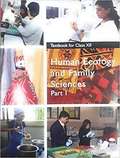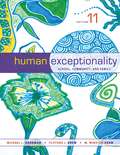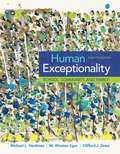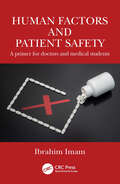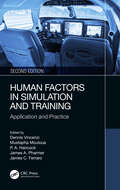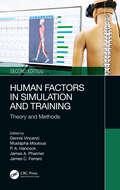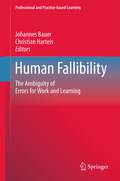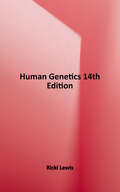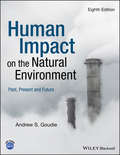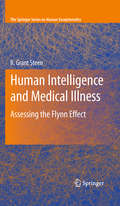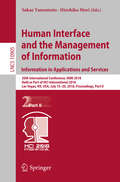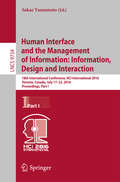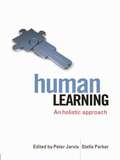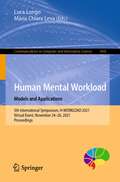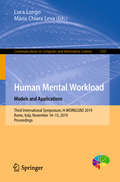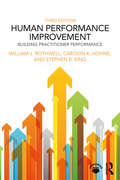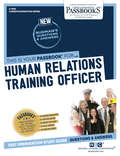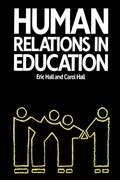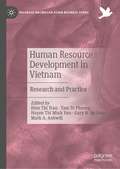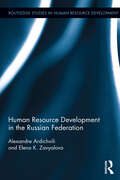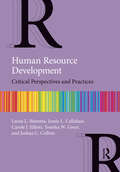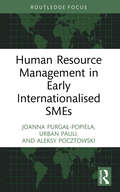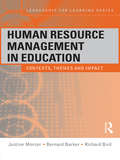- Table View
- List View
Human Ecology and Family Sciences Part 1 class 11 - NCERT
by National Council of Educational Research and TrainingPublished by the NCERT, this textbook of Human Ecology and Family Sciences will be of immense help for the students of Class 11. It gives the students a better understanding of the adolescence and also the biological, physical, socio-cultural and emotional changes that one undergoes. Students also get to know about the importance of a family, a community and a society. Written in a simple, easy to understand format, this book covers all the topics that have been prescribed by the Central Board of Secondary Education (CBSE).
Human Exceptionality: School, Community and Family, 11th Ed.
by Michael L. Hardman Clifford J. Drew M. Winston EganHUMAN EXCEPTIONALITY is an excellent resource for preparing teacher education candidates and practicing teachers, as well as a range of human services professionals. The book's unique human approach combines the most current research, personal stories about people with exceptionalities, and new and innovative features that create opportunities for readers to better understand and apply the information in each chapter.
Human Exceptionality: School, Community, And Family
by Michael L. Hardman Clifford J. Drew M. Winston EganExpanding on its widely respected and unique focus on the critical role of professionals in education, psychology, counseling, health care, and human services, HUMAN EXCEPTIONALITY: SCHOOL, COMMUNITY, AND FAMILY, 12th Edition, is an evidence-based testament to how cross-professional collaboration enhances the lives of exceptional individuals and their families. This text's unique lifespan approach combines powerful research, evidence-based practices, and inspiring stories, engendering passion and empathy and enhancing the lives of individuals with exceptionalities. Designed to help students experience individuals with disabilities and their families in a personal and intimate fashion, HUMAN EXCEPTIONALITY is an excellent resource for preparing both preservice and practicing teachers, as well as a range of other human services professionals in the fields of psychology, sociology, social work, and the health sciences.
Human Factors and Patient Safety: A primer for doctors and medical students
by Ibrahim ImamThis book fulfils the need of doctors, medical students, and all healthcare personnel for information that addresses fundamental patient safety concepts that are not usually covered in conventional medical curricula.There are three valuable features. Firstly, the content encompasses the main areas of human factors and patient safety in short and easily accessible language supplemented by anecdotes from safety-critical industries such as aviation and nuclear power. Secondly, each chapter highlights the problems of human error and provides solutions that help to reduce the risks to patients. Finally, the coverage highlights the important role the public should play in protecting their own safety when in contact with healthcare systems.
Human Factors in Simulation and Training: Application and Practice
by Dennis Vincenzi, Mustapha Mouloua, P. A. Hancock, James A. Pharmer, and James C. FerraroHuman Factors in Simulation and Training: Application and Practice covers the latest applications and practical implementations of advanced technologies in the field of simulation and training. The text focuses on descriptions and discussions of current applications and the use of the latest technological advances in simulation and training. It covers topics including space adaptation syndrome and perceptual training, simulation for battle-ready command and control, healthcare simulation and training, human factors aspects of cybersecurity training and testing, design and development of algorithms for gesture-based control of semi-autonomous vehicles, and advances in the after-action review process for defence training. The text is an ideal read for professionals and graduate students in the fields of ergonomics, human factors, computer engineering, aerospace engineering, occupational health, and safety.
Human Factors in Simulation and Training: Theory and Methods
by Dennis Vincenzi, Mustapha Mouloua, P. A. Hancock, James A. Pharmer, and James C. FerraroHuman Factors in Simulation and Training: Theory and Methods covers theoretical concepts on human factors principles as they apply to the fields of simulation and training in the real world. This book discusses traditional and nontraditional aspects of simulation and training. Topics covered include simulation fidelity, transfer of training, limits of simulation and training, virtual reality in the training environment, simulation-based situation awareness training, automated performance measures, performance assessment in simulation, adaptive simulation-based training, and scoring simulations with artificial intelligence This book will be a valuable resource for professionals and graduate students in the fields of ergonomics, human factors, computer engineering, aerospace engineering and occupational health and safety.
Human Fallibility: The Ambiguity of Errors for Work and Learning
by Christian Harteis Johannes BauerA curious ambiguity surrounds errors in professional working contexts: they must be avoided in case they lead to adverse (and potentially disastrous) results, yet they also hold the key to improving our knowledge and procedures. In a further irony, it seems that a prerequisite for circumventing errors is our remaining open to their potential occurrence and learning from them when they do happen. This volume, the first to integrate interdisciplinary perspectives on learning from errors at work, presents theoretical concepts and empirical evidence in an attempt to establish under what conditions professionals deal with errors at work productively--in other words, learn the lessons they contain. By drawing upon and combining cognitive and action-oriented approaches to human error with theories of adult, professional, and workplace learning this book provides valuable insights which can be applied by workers and professionals. It includes systematic theoretical frameworks for explaining learning from errors in daily working life, methodologies and research instruments that facilitate the measurement of that learning, and empirical studies that investigate relevant determinants of learning from errors in different professions. Written by an international group of distinguished researchers from various disciplines, the chapters paint a comprehensive picture of the current state of the art in research on human fallibility and (learning from) errors at work.
Human Genetics: Concepts and Applications
by Ricki LewisHuman Genetics: Concepts and Applications embraces the broadening of human genetics from an academic and medical discipline to an informational science that can be highly personal, yet have a societal impact. By coming to know genetic backgrounds, people can control their environments in healthier ways. Genetic knowledge is, therefore, both informative and empowering.
Human Impact on the Natural Environment: Past, Present, And Future
by Andrew S. GoudieA brand new edition of the definitive textbook on humankind’s impact on the Earth’s environment—now in full color This classic text explores the multitude of impacts that humans have had over time upon vegetation, animals, soils, water, landforms, and the atmosphere. It considers the ways in which climate changes and modifications in land cover may change the environment in coming decades. Thoroughly revised to cover the remarkable transformation in interest that humans are having in the environment, this book examines previously uncovered topics, such as rewilding, ecosystem services, techniques for study, novel and no analogue ecosystems, and more. It also presents the latest views on big themes such as human origins, the anthropocene, domestication, extinctions, and ecological invasions. Extensively re-written, Human Impact on the Natural Environment, Eighth Edition contains many new and updated statistical tables, figures, and references. It offers enlightening chapters that look at the past and present state of the world—examining our impact on the land itself and the creatures that inhabit it; the oceans, lakes, rivers and streams; and the climate and atmosphere. The book also takes a deep look at our future impact on the planet and its resources—our affect on the coastal environments, the cryosphere and the drylands, as well as the hydrological and geomorphological impacts. Fully updated to take account of recent advances in our understanding of global warming and other phenomena Offers current opinions on such topics as human origins, the anthropocene, domestication, extinctions, and ecological invasions Features a full-color presentation to allow for more and clearer photographs and diagrams Contains more international case studies than previous editions to balance UK examples Human Impact on the Natural Environment is essential reading for undergraduates in geography and environmental science, and for those who want a thorough, wide-ranging and balanced overview of the impacts of humans upon natural processes and systems from the Stone Age to the Anthropocene and who wish to understand the major environmental issues that concern the human race at the present time.
Human Intelligence and Medical Illness
by R. Grant SteenThere's little doubt that people are growing smarter. This effect is so strong that IQ tests must be renormed periodically to prevent classifying an overabundance of people as geniuses. The question is why is this collective rise in IQ - known as the Flynn effect -occurring? Possible theories to explain the Flynn effect have ranged from better parenting to faster evolution. Bringing a bold new voice to the debate, Human Intelligence and Medical Illness sets out a simple definition of intelligence that is appropriate for assessing intelligence at the population level. The definition is then used to probe the relationship between population intelligence and public health. This volume uses the latest medical and behavioral science research to argue that declines in serious disease and illness-causing conditions (e.g., lead paint in buildings) correlate strongly with continued cognitive gains in both developed and developing countries. Current political realities explain why the Flynn effect should be approached as a public policy as well as a public health issue. This provocative volume: Reviews the most widely held hypotheses accounting for the Flynn effect. Examines the relationship between intelligence and public health. Assesses the extent to which public health improvements can potentially account for the Flynn effect. Details how treatment of common medical problems may result in a substantial rise in IQ. Explores the possibility of continued IQ gains in the United States and worldwide. Reframes the Flynn effect in the contexts of public health, early childhood education, and social justice. With its groundbreaking findings on the causes of cognitive impairment and the possibility of cognitive improvement, Human Intelligence and Medical Illness is must-reading for researchers, professors, and graduate students in developmental psychology, education, public health, psychiatry, neuroscience, social work, and related fields.
Human Interface and the Management of Information. Information in Applications and Services: 20th International Conference, HIMI 2018, Held as Part of HCI International 2018, Las Vegas, NV, USA, July 15-20, 2018, Proceedings, Part II (Lecture Notes in Computer Science #10905)
by Sakae Yamamoto Hirohiko MoriThis two-volume set LNCS 10904 and 10905 constitutes the refereed proceedings of the 20th International Conference on Human Interface and the Management of Information, HIMI 2018, held as part of HCI International 2018 in Las Vegas, NV, USA, in July 2018.The total of 1170 papers and 195 posters included in the 30 HCII 2018 proceedings volumes was carefully reviewed and selected from 4373 submissions.The 53 papers presented in this volume were organized in topical sections named: interacting with information; information and learning; information in aviation and transport; intelligent systems; and sevice management.
Human Interface and the Management of Information: 18th International Conference, HCI International 2016 Toronto, Canada, July 17-22, 2016, Proceedings, Part I (Lecture Notes in Computer Science #9734)
by Sakae YamamotoThe two-volume set LNCS 9734 and 9735 constitutes the refereed proceedings of the Human Interface and the Management of Information thematic track, held as part of the 18th International Conference on Human-Computer Interaction, HCII 2016, held in Toronto, Canada, in July 2016. HCII 2016 received a total of 4354 submissions of which 1287 papers were accepted for publication after a careful reviewing process. These papers address the latest research and development efforts and highlight the human aspects of design and use of computing systems. The papers accepted for presentation thoroughly cover the entire field of human-computer interaction, addressing major advances in knowledge and effective use of computers in a variety of application areas This volume contains papers addressing the following major topics: information presentation; big data visualization; information analytics; discovery and exploration; interaction design, human-centered design; haptic, tactile and multimodal interaction.
Human Learning
by Jeanne OrmrodThe market-leading text on learning theories applied to education, this book draws readers in with a lucid and engaging writing style. It covers a broad range of theoretical perspectives, while including numerous classroom examples of how these theories apply to learning, instruction, and assessment. The market-leading education textbook on learning theories, Human Learning looks at a broad range of theoretical perspectives, including behaviorist, social cognitive, cognitive, constructivist, contextual, and developmental theories. It describes associationistic processes, such as classical and operant conditioning, as well as more complex and distinctly human processes such as metacognition, self-regulated learning, and critical thinking. Using many concrete examples and specific classroom applications, plus a lucid, conversational writing style that truly speaks to students, the author engages students from the start, and makes the concepts, principles, and theories related to human learning and cognition meaningful.
Human Learning and Memory
by David A. LiebermanThis innovative textbook is the first to integrate learning and memory, behaviour, and cognition. It focuses on fascinating human research in both memory and learning (while also bringing in important animal studies) and brings the reader up to date with the latest developments in the subject. Students are encouraged to think critically: key theories and issues are looked at in detail; descriptions of experiments include why they were done and how examining the method can help evaluate competing viewpoints. By looking at underlying cognitive processes, students come away with a sense of learning and memory being interrelated actions taken by the same human being, rather than two separate activities. Lively and engaging writing is supported by lots of examples of practical applications that show the relevance of lab-based research to everyday life. Examples include treatments for phobias and autism, ways to improve eyewitness testimony, and methods of enhancing study techniques.
Human Learning: An Holistic Approach (Lifelong Learning And The Learning Society Ser.)
by Peter Jarvis Stella ParkerLearning is among the most basic of human activities. The study of, and research into, learning forms a central part of educational studies. The well-respected and established authors, Jarvis and Parker, not only focus on the psychological processes of human learning, but they also examine the importance of the relationship between the body and the mind. For the first time, this book considers how our neurological, biological, emotional and spiritual faculties all impact on human learning. Topics covered include: the biology of learning personality and human learning thinking and learning styles gender and human learning life cycle development and human learning emotional intelligence and learning morality and human learning learning in the social context. Drawing on material from the worlds of science and social science, and with contributions from international authors, this book will be of interest to academics in a wide range of disciplines.
Human Mental Workload: 5th International Symposium, H-WORKLOAD 2021, Virtual Event, November 24–26, 2021, Proceedings (Communications in Computer and Information Science #1493)
by Luca Longo Maria Chiara LevaThis book constitutes the refereed proceedings of the 5th International Symposium on Human Mental Workload: Models and Applications, H-WORKLOAD 2021, held virtually in November 2021.The volume presents 9 revised full papers, which were carefully reviewed and selected from 16 submissions. The papers are organized in two topical sections on models and applications.
Human Mental Workload: Third International Symposium, H-WORKLOAD 2019, Rome, Italy, November 14–15, 2019, Proceedings (Communications in Computer and Information Science #1107)
by Luca Longo Maria Chiara LevaThis book constitutes the refereed proceedings of the Third International Symposium on Human Mental Workload: Models and Applications, H-WORKLOAD 2019, held in Rome, Italy, in November 2019.The volume presents one keynote paper as well as 14 revised full papers, which were carefully reviewed and selected from 32 submissions. The papers are organized in two topical sections on models and applications.
Human Performance Improvement: Building Practitioner Performance (Improving Human Performance Ser.)
by William J. Rothwell Stephen B. King Carolyn K. HohneOrganizations are under pressure to build and sustain competitive advantage with and through people. For that reason, managers continue to demand results from workers and look for as many ways as possible to increase productivity and decrease the costs of doing business. Human performance improvement (HPI) is a systematic approach to securing better performance from people. This book provides a thorough overview of the theory and practice of HPI, looking at the long-term action plan and specific interventions that can improve productivity and address performance problems. This new edition provides up-to-date references and sources, examines the manager’s role in HPI in more detail than previous editions, and explores how to build on human performance improvement strengths and opportunities. Written by a group of highly respected authors in the field, this book will show you how to discover and analyze performance gaps, plan for future improvements in human performance, and design and develop cost-effective interventions to close performance gaps. HPI is not a tool reserved exclusively for training and development practitioners, human resource specialists, or external consultants. Almost anyone can use it, including managers, supervisors, and even employees, making this book vital reading for anyone looking to improve human performance.
Human Relations Training Officer: Passbooks Study Guide (Career Examination Series)
by National Learning CorporationThe Human Relations Training Officer Passbook® prepares you for your test by allowing you to take practice exams in the subjects you need to study. It provides hundreds of questions and answers in the areas that will likely be covered on your upcoming exam, including but not limited to: identifying and understanding issues concerning intergroup human relations and discrimination, particularly as they affect women, the disabled, the elderly and minorities; understanding and interpreting written material and applying laws relating to human and civil rights; training principles and practices; preparing written material; and more.
Human Relations in Education
by Eric Hall Carol HallAs a teacher, how can I increase my personal effectiveness, and how can I improve the quality of relationships in the classroom? These are the two fundamental questions which Human Relations in Education sets out to answer - in a way that will appeal to all those concerned with education. Eric and Carol Hall examine issues such as self-concept, social and emotional learning, the dynamics of the staffroom and the classroom, as well as stress management and relaxation. They demonstrate how these affect human relations in schools and colleges. Interpersonal communications and counselling skills are then examined in terms of language, imagery and non-verbal communication. With its original blend of theory and practical exercises, Human Relations in Education is essential reading for both experienced teachers and teachers in training.
Human Resource Development in Vietnam: Research and Practice (Palgrave Macmillan Asian Business Series)
by Mark A. Ashwill Gary N. McLean Hien Thi Tran Tam To Phuong Huyen Thi Minh VanDespite recent high GDP growth rates, Vietnam remains a developing country in need of developing human resources (HR) of both genders. This can be done through education, workplace training, corporate social responsibility, policies for gender equality, support for entrepreneurship, and other practices and policies. Yet, national human resource development (NHRD) is a relatively new concept in Vietnam. This edited volume highlights the importance of HR, HRD, and NHRD, enabling Vietnam to experience sustainable growth and become a modern industrial country. It examines the positive changes effected by HRD considering Vietnam’s unique historical, political, economic, and cultural contexts. This book offers scholars and practitioners an indigenous HRD approach and discusses implications for future research and practices.
Human Resource Development in the Russian Federation (Routledge Studies in Human Resource Development)
by Alexandre Ardichvili Elena ZavyalovaUnlike Brazil, India, or China, prior to the beginning of market-oriented reforms in early 1990s, Russia maintained a high level of human capital and possessed a highly developed system of vocational education, continuous education, and management development institutions sponsored by the government. However, after the beginning of the market reforms many state-sponsored programs were disbanded and individual enterprises and newly emerging private educational institutions found themselves in a position of having to provide training and professional development services for future and current employees. Both government-level policies in support of HRD and enterprise-level HRD systems have emerged fairly recently in the Russian Federation, and are still in a stage of change and development. This book provides an in-depth analysis of the current state of HRD in the Russian Federation. It covers country-level policies, organizational-level programs and strategies, and individual-level educational and training efforts. While the study is focused on Russia, its conclusions will be of value to scholars, students, and practitioners examining similar issues surrounding the emergence and development of HRD systems in emerging countries. Furthermore, the authors’ framework for analyzing HRD on multiple levels and across various parts of the adult and vocational education and development systems offers a unique and important contribution to the theoretical debate on comparative educational systems outside the HRD and HRM communities.
Human Resource Development: Critical Perspectives and Practices
by Laura L. Bierema Joshua C. Collins Jamie L. Callahan Carole J. Elliott Tomika W. GreerHuman Resource Development: Critical Perspectives and Practices is a landmark textbook on HRD scholarship and practice and is a significant departure from the standard HRD texts available. Based on Bierema and Callahan’s framework for critical human resource development, this book develops an understanding of HRD that addresses both key and contested issues of practice associated with relating, learning, changing, and organizing for organizations. This book covers the basic tenets of HRD, interrogates the dominant paradigms and practices of the field, teaches readers how to critically assess HRD practices and outcomes, and provides critical alternatives. The text also addresses HRD as a contested field and the importance for HRD professionals to reflect on their values, maintain their sanity, and retain their employment while attempting to do this difficult work that serves multiple stakeholders. The text weaves in Points to Ponder, Case in Point, and Tips & Tools features and exercises, giving readers an insight into HRD issues across the globe. This critical text offers an exciting alternative to the instrumentalist, managerialist, and masculine perspective of other books. Designed for students and practitioners, this textbook will be essential reading for upper-level courses on human resource development, human resource management, and adult education.
Human Resource Management in Early Internationalised SMEs (Routledge Focus on Business and Management)
by Aleksy Pocztowski Urban Pauli Joanna Purgał-PopielaSmall- and medium-sized enterprises (SMEs) are increasingly viewed as valuable contributors to the global economy, which translates into their importance in business literature and academic research. Recent studies suggest that there exists a substantial variety of international activities pursued by SMEs expanding abroad, with a prominent presence of early internationalised enterprises, including born global. Despite the acknowledgement of the importance of human capital for SME internationalisation, there is a persistent knowledge gap concerning HR practices in this context. Until now, researchers investigating the accelerated internationalisation of SMEs have focused either on the human capital of decision-makers or selected attributes of employees, although these have only been at the pre-entry or entry stages. Thus, activities performed after entering foreign markets remain. This book attempts to reduce this gap and contribute to the body of knowledge concerning HR practices in early internationalised SMEs with an emphasis on the post-entry phase. By taking such an approach, this volume integrates two streams of research: HRM in the SMEs and international business. It provides managers of SMEs with useful information on dealing with internationalisation-related challenges by means of various practices including work structuring, recruitment and selection, training and development, employee appraisal and remuneration, and performance management. The discussion of these issues is based upon data from a survey conducted in 200 SMEs and case studies exemplifying HR practices in early internationalised small and medium enterprises. It offers academic researchers, postgraduate students, and reflective practitioners a state-of-the-art overview of managing human resources in small and medium enterprises expanding internationally, including both accelerated and incremental paths.
Human Resource Management in Education: Contexts, Themes and Impact (Leadership for Learning Series)
by Richard Bird Justine Mercer Bernard BarkerThe study of educational leadership makes little sense unless it is in relation to who the leaders are, how they are leading, what is being led, and with what effect. Based on the premise that learning is at the heart of leadership and that leaders themselves should be learners, the Leadership for Learning series explores the connections between educational leadership, policy, curriculum, human resources and accountability. Each book in the series approaches its subject matter through a three-fold structure of process, themes and impact. Series Editors - Clive Dimmock, Mark Brundrett and Les Bell The effects of globalization are evident in education policy around the world. Governments from the United States to China are driving their education systems to produce more skilled, more flexible, more adaptable employees. The pressure to perform is all-pervasive, meaning present-day leaders have to go beyond the principles of humane and equitable management practice and look for a competitive advantage through strategies that enhance motivation, build capacity for organizational improvement, and produce better value-added performance. Human Resource Management in Education debates the fundamental question of how far effective human resource management policies can enable schools and colleges to transcend the paradoxes of the global reform agenda. It analyses the relationship between leadership, the classroom and results, and uses case studies to explore the extent to which performance is enhanced by distributed leadership and constrained by social, political and economic contexts. The book is divided into three parts: examining the current context of human resource management, by critically analysing globalization, human capital theory, and worldwide trends in government legislation, societal values, and teacher culture(s); exploring two pairs of contemporary themes in human resource management, by comparing the roles of leaders and followers, on the one hand, and contrasting learning and greedy organizations, on the other; looking at how the context and the themes impact on particular contemporary practices in human resource management, by analysing the selection and development of professionals, the remodelling of school teams and the management of performance. The authors carefully blend advocacy with evidence to ensure relevance for both practitioner and academic audiences across the globe. The book would be of particular use to students on masters courses in educational leadership.
